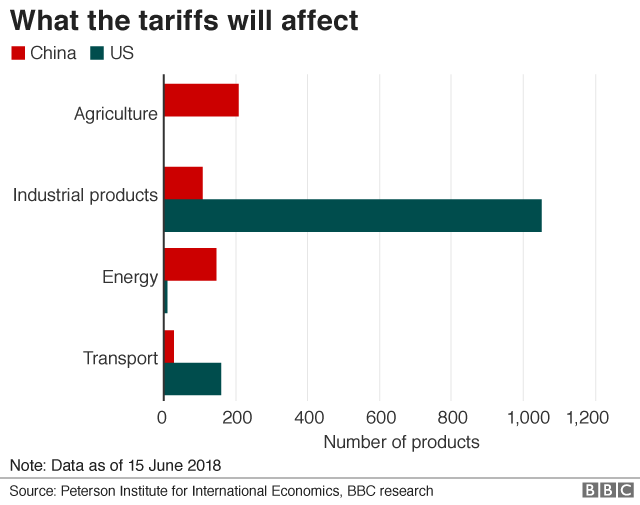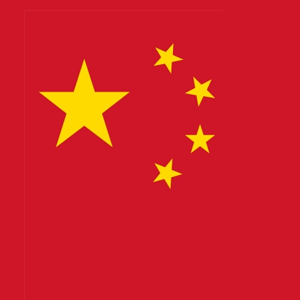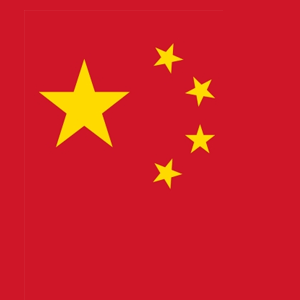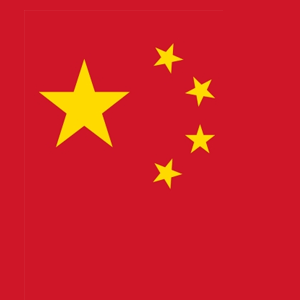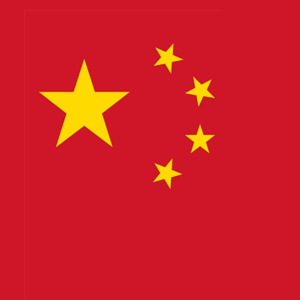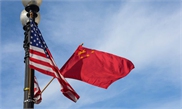 |
| Tit for tat: The trade scuffle between US and China threatened to escalate to a full-scale war when Beijing fired back with punitive taxes on a wide range of US goods entering China - Reuters |
The dispute between the two countries is real and has escalated. Malaysia is feeling the heat, but its palm oil sector is set to shine in this conflict.
THE US-China trade war drummed up by Washington last month threatened to escalate to a fullscale confrontation when Beijing fired back last week with punitive taxes on a wide range of US goods entering China.
And Malaysia, being an open economy with huge exports to China and the United States, is feeling the heat of the tit-for-tat measures rolled out by the two largest economies in the world.
President Donald Trump has given several reasons to act against China. A key reason is trade imbalance and US large trade deficit, which he attributed to China.
In 2017, China exported US$505bil (RM1.95 trillion) in goods to the United States, which in turn exported US$135bil (RM522.4bil) in goods to China.
The Trump administration has also alleged that China sought to misappropriate US intellectual property through joint venture requirements, unfair technology licensing rules, purchases of US technology firms with state funding and outright theft.
Last month, Trump slapped Beijing with punishing tariffs on the import of steel and aluminium products, and warned that there would be higher taxes on about 1,300 Chinese products worth US$50bil (RM193.5bil).
China, which has often stated that it does not want a trade war as it would hurt all, retaliated last Monday by imposing additional duties of 15% to 25% on 128 US products worth up to US$3bil (RM11.6bil). Pork, recycled aluminium, steel pipes, wine and fruits are on the list.
After being criticised by its own elites that it was too soft in its retaliation, China’s State Council announced on Wednesday that it planned to impose additional tariffs of 25% on 106 US products into the country, including soybeans, aircraft and cars. The import value of the goods on the list in 2017 was US$50bil.
Beijing’s Wednesday response came soon after the US Trade Representative Office released details of 1,333 Chinese imports worth about US$50bil that it planned to hit with 25% tariffs, with emphasis on industrial and hi-tech goods.
Global Times, the official mouthpiece of the Communist Party of China (CPC), said in an editorial on Wednesday before its State Council’s statement: “China’s countermeasures should deal a heavy blow, hitting what the United States fears most. We strongly recommend starting with US soybeans and corn products. The ruling GOP will pay a huge price.”
It noted that nervous US soybean farmers, who were big supporters of Trump during the presidential campaign in 2016, had run advertisements to oppose launching a trade war against China.
China’s former finance minister Lou Jiwei reportedly said at a recent forum: “If I were in the government, I would hit soybeans first, and then cars and planes.”
By imposing punishing tariffs on US soybeans, Beijing will hurt US major farmers, given that China was the second largest importer of US agricultural products last year, buying US$19.6bil (RM73.5bil) of goods with 63% spent on soybeans.
As reducing US soybean imports would leave a shortfall for Chinese edible oil consumption and animal feed, this would need to be filled by imports from other countries. One source could be palm oil from Malaysia.
“Malaysia’s palm oil growers would stand to enjoy a windfall gain if China reduces the intake of soybeans from the United States, though our competitors like Indonesia also hope to sell more to China,” says economist Lee Heng Guie, executive director of SocioEconomic Research Centre (SERC).
In fact, the futures contracts of Malaysian crude palm oil (CPO) rose on Wednesday after China’s announcement. The positive impact on CPO prices continued on Thursday.
However, the local stock market – like other markets in the region – plummeted, as many investors believed more tit-for-tat measures covering more industries would be unveiled in this spat. The FBM KLCI lost 1.88% to close at its nineweek low of 1,815.94 points.
The local stock market has been weakening due to fear of this trade war. The technology stocks are particularly jittery as the US tariffs are seen as targeting mainly the Chinese electrical and electronic (E&E) and machinery sectors.
“In our view, the sectors that could be affected by the US-China trade war due to recently proposed import tariffs are semiconductors, building materials and ports in Malaysia,” said CIMB Research in a report on Thursday.
As Malaysia exports many E&E products and parts to China, local players within this supply chain are likely to feel the heat.
“We estimate Malaysia’s ultimate exposure to the United States – including via intermediate goods to China for assembly into final products destined for the United States – at 10% of GDP, about half of which is in electronics products,” Nomura Research says, adding that another 8% is exposed to China’s final demand.
While exports to China account for 13.5% of total annual exports of Malaysia, exports to the United
States make up 9.5%. And E&E products form the biggest export item to both countries.
Nomura sees US trade protectionism and a sharper-than-expected slowdown in China as posing risks to the Malaysian economy, as exports account for 71% of its GDP.
This trade conflict has been listed by Moody’s as a global risk this year.
Consultancy Oxford Economics says the escalation of the trade war could knock 0.5% off global growth in 2019.
Although earlier this year many analysts and business groups in the United States had warned that Washington would not win in this trade war, Trump charged ahead nevertheless.
The modern and economically mighty China, under President Xi Jinping, will punch back decisively and swiftly, many have warned.
The pain points of China are not easy to find. Over a decade ago, Beijing had realised it could not rely on the low value-adding export processing industries.
The country is now focusing on developing its high-technology sector and expanding the domestic consumer market to cut down on reliance on exports.
With so many odds against America, why would Trump insist on taking on China?
According to an analysis by Hong Kong-based International Chinese Newsweekly, the rise of American nationalism and Trump’s gearing up for the mid-term elections is the key reason for the president’s plunge into a trade war.
His focus is on midterm elections and keeping a Republican majority in Senate and Congress. But he will have to deal with the possible backlash from the first round of USChina trade war once it goes full on.
Apart from the soybean sector, the United States’ aircraft and automobile sectors will be hit.
According to South China Morning Post, Boeing Corporation delivered 202 planes to China in 2017, or 26% of its global total. The company has projected that in the next 20 years, China will need 7,240 new planes valued at about US$1.1 trillion (RM4.26 trillion).
On the auto sector, the United States sold more than US$10bil (RM38.7bil) worth of vehicles to China. Last year, General Motors sold 3.9 million cars to China, or almost 39% of its global total. The company expects sales in China to grow to five million by 2020.
The Hong Kong newspaper also warned that if China discourages its nationals from visiting the United States, the impact on US tourism will be painful.
In 2016, three million Chinese visitors and students spent US$33bil (RM127.7bil) while in the United States. The US Department of Commerce expects Chinese visitors rise to 5.7 million by 2021.
The other weapon China could weild against Washington is off-loading its US treasury bonds. This will have an impact on the dollar and US interest rate.
Bejing’s holding of US treasury bonds was close to US$1.2 trillion (RM4.6 trillion) at end-2017.
How long the current trade tension will last is anybody’s guess, given Trump’s unpredictable character. The world still remembers that he showered Xi with praises before turning his back on China.
But one thing is certain: if US protectionism and the trade war escalates, it will hurt not only the two major economies, but also countries which have trade links with the two powers.
“The global repercussions will be highly disruptive and damaging on trade and economy if the US-China trade war deepens and impacts more products and countries. In such widespread trade conflicts, Malaysia’s trade will be significantly dampened,” says Lee from SERC.
By Ho Wah Foon The Star
When 2 elephantine economies fight...
 |
Upping the stakes: Trump has ordered his
administration to consider imposing tariffs on an additional US100bil of
Chinese imports. Chinese President Xi Jinping had earlier hit back with
US50bil worth of tariffs on US imports.
|
Will Malaysia be caught in the middle?
The trade war between the world’s two largest economies is not showing any sign of stopping just yet.
US president Donald Trump initiated the trade confrontation by announcing additional 25% tariffs on Chinese imports worth US$50bil, citing China’s unfair trade advantage. In retaliation, China initially announced higher tariffs on US$3bil imports from the US, but later raised it to US$50bil.
Now, Trump has ordered his administration to consider imposing tariffs on an additional US$100bil of Chinese imports.
While it remains to be seen whether these tit-for-tat announcements will materialise or eventually fizzle out, economists and fund managers generally agree that the US-China trade fight will affect Malaysia’s local industries and several stocks on Bursa Malaysia.
However, they differ on the extent of the impct from the escalating trade war.
In an email interview with StarBizWeek, Asian Strategy and Leadership Institute research and business development director Lau Zheng Zhou says that Malaysia will be hit with losses in trade opportunities, as both the US and China constitute 25% of Malaysia’s total trade.
He points out that investors may adopt a “wait-and-see” approach, which could cause certain sectors to slow down and hence disrupt manufacturers’ resource planning and projection.
“As opposed to exporting finished goods, Malaysian exports have footprints along an extensive supply chains across sectors in Asia such as automobiles, electronics, oil and gas, and machinery.
“With heavy tariffs being imposed by the US, Malaysian firms will be slapped with rising input costs and therefore falling demand for their value-added component products.
“Our logistics sector may also be affected if global trade slows down.
“But China’s tariffs imposed on the US may not directly impact Malaysia as it is strategically designed to cause damage to the US agricultural producers,” he says.
On the other hand,
Malayan Banking Bhd 
group chief economist Suhaimi Ilias indicates that the potential impact from the US-China trade spat is small, or only 0.3% of total trade value, at this juncture
However, greater risks could arise if the additional tariffs spill into services trade and investment.
“In any case, US tariffs on solar panels, steel and aluminum will have some impact on Malaysia but we understand that the International Trade and Industry Ministry is seeking exemptions for these since Malaysia is in talk with the US on the Trade and Investment Framework Agreement (TIFA) as an alternative following the US pulling out of the Trans-Pacific Partnership.
“Meanwhile, China’s tariffs on US products may result in some trade diversions or substitutions that may result in increase demand for Malaysian products from China, and one potential area is chemical or petrochemical products which is a major industry and export for Malaysia,” states Suhaimi.
Currently, the Trump administration has proposed a long list of 1,333 items, which would see the imposition of an additional 25% tariff.
These items include robotics, aircraft seats, machine parts, semiconductors, communication satellites and television components, among others.
It is worth noting that there will be 60 days of public review before the tariffs take effect. Observers believe both China and the US will re-negotiate their trade terms during this period in order to prevent a full-fledged trade war.
More items affected
In the event of the US government imposing tariffs on the additional US$100bil worth of Chinese imports as per Trump’s suggestion, more items will be affected.
China, on its part, has announced that it will slap a similar 25% additional tariff on 106 products from the US, which include soybean, automobiles, chemicals and aircraft.
According to Lau, China’s tariffs are well-targeted to hurt rural, agriculture-dependent communities who were big supporters of Trump during the 2016 presidential election.
Many companies in Malaysia have been involved in the export of raw materials and intermediate goods to China and the US, which are later re-packaged or used in the production of other finished goods.
These finished goods, in turn, are exported by both China and the US to one another as well as to other countries.
Indirectly, the Sino-US trade spat will affect these exporting companies from Malaysia.
Suhaimi calls for accommodative monetary policy and the implementations of major investment and infrastructure projects to buttress Malaysia’s economic activities, if the trade dispute continues to worsen.
Fund managers’ take
Fortress Capital chief executive officer Thomas Yong says that the Malaysian semiconductor sector will be most negatively affected due to the trade spat.
“This is because most semiconductor companies in Malaysia export intermediate semi-conductor components to end-product manufactures in the US, and a tariff on these end-products could indirectly lower the demand from these component players,” he says.
He cautions investors to monitor the ongoing trade war between the US and China closely.
“If the tariffs are implemented, the impact will be very detrimental to the ongoing global growth recovery.
“A trade war will negatively affect stock valuations all around the world,” he says.
Similar to Yong’s perspective, Areca Capital chief executive officer Danny Wong also reckons that export-based Malaysian businesses in the electrical and electronics domain could be affected, especially if their exposure to both China and the US is significantly large.
However, both fund managers believe that the Sino-US trade spat may not be entirely bad for companies in Malaysia.
Wong tells StarBizWeek that the US’ Federal Reserve (Fed) may take necessary actions to remedy any unwarranted implications to the economy.
“If the trade war continues to prolong and ultimately weigh down global growth and trade, it could affect the Fed’s future actions.
“Hence, there is a likelihood for the Fed to put the expected interest rate hikes on hold.
“In the event of such decision, dividend stocks in Bursa Malaysia will definitely benefit.
“On top of that, the real estate investment trust (REIT) stocks will also benefit from the situation, as Reits thrive in the low interest rate environment,” he says.
Meanwhile, Fortress Capital’s Yong adds that stocks related to palm oil production may also benefit from the trade spat.
“Since crude palm oil (CPO) is a substitute for soybean oil, the Chinese tariff on American soybeans can potentially allow China to substitute to CPO to meet their vegetable oil consumption needs, in turn supporting the demand and prices for CPO.
“As Malaysia and Indonesia both account for more than 80% of global palm oil supply, oil plantation companies from these two countries could potentially benefit from the much needed price boost amid the current soft CPO price.
“However, it remains uncertain if China will substitute all of the current soybean oil consumption to CPO, as there are quite a number of other vegetable oils available in the market,” he says.
Earlier, StarBiz reported that the American Malaysian Chamber of Commerce (Amcham) believes Malaysia may see an increased amount of foreign investments, particularly from the US, if the brewing trade war between the US and China escalates further.
Businesses from the US and other countries could make Malaysia an alternative regional production hub for several goods instead of China, to avoid the additional tariffs imposed by the US on products imported from China.
The additional 25% tariff levied on the imports from China would likely make Chinese goods pricier. Under such circumstances, global manufacturers may opt to establish their operations in Malaysia or outsource their production to a domestic company.
Commenting on whether the Sino-US trade war will place Malaysia as an alternative to China in the eyes of investors, Lau says it is not reasonable for investors to do so.
“However, the trade spat may rather increase foreign direct investments, especially from China, in industries with heavy use of steel and aluminium or value-added manufacturing of innovative consumer products.
“This can avoid a ban, restrictions or high tariffs on products which are associated with China,” he says.
By Ganeshwaran Kana The Star
Related news:
 Trade war – more of letting off hot air so far - Business News
Trade war – more of letting off hot air so far - Business News

Related post:
